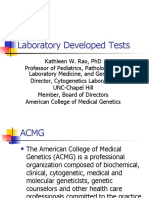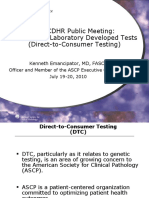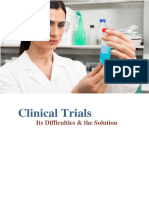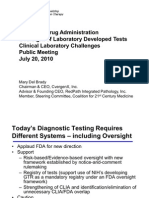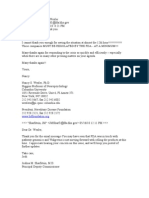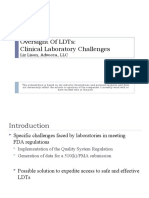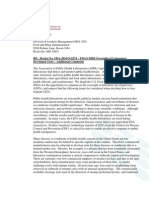0 ratings0% found this document useful (0 votes)
15 viewsGeorgirene D. Vladutiu, PH.D
Georgirene D. Vladutiu, PH.D
Uploaded by
fdablogThis document discusses compliance requirements for biochemical genetic laboratories, including CLIA certification and proficiency testing. It notes that biochemical genetic testing has unique aspects compared to DNA testing and requires specialized interpretation. New guidelines have been released for biochemical and molecular genetic laboratories. The document also discusses concerns about FDA oversight of laboratory developed tests, including ensuring they are properly validated. It argues that risk-based oversight is needed and that increased regulation could increase costs and decrease access to biochemical genetic testing services.
Copyright:
Attribution Non-Commercial (BY-NC)
Available Formats
Download as PPS, PDF, TXT or read online from Scribd
Georgirene D. Vladutiu, PH.D
Georgirene D. Vladutiu, PH.D
Uploaded by
fdablog0 ratings0% found this document useful (0 votes)
15 views8 pagesThis document discusses compliance requirements for biochemical genetic laboratories, including CLIA certification and proficiency testing. It notes that biochemical genetic testing has unique aspects compared to DNA testing and requires specialized interpretation. New guidelines have been released for biochemical and molecular genetic laboratories. The document also discusses concerns about FDA oversight of laboratory developed tests, including ensuring they are properly validated. It argues that risk-based oversight is needed and that increased regulation could increase costs and decrease access to biochemical genetic testing services.
Original Title
FDA-2010-N-0274-0054.2
Copyright
© Attribution Non-Commercial (BY-NC)
Available Formats
PPS, PDF, TXT or read online from Scribd
Share this document
Did you find this document useful?
Is this content inappropriate?
This document discusses compliance requirements for biochemical genetic laboratories, including CLIA certification and proficiency testing. It notes that biochemical genetic testing has unique aspects compared to DNA testing and requires specialized interpretation. New guidelines have been released for biochemical and molecular genetic laboratories. The document also discusses concerns about FDA oversight of laboratory developed tests, including ensuring they are properly validated. It argues that risk-based oversight is needed and that increased regulation could increase costs and decrease access to biochemical genetic testing services.
Copyright:
Attribution Non-Commercial (BY-NC)
Available Formats
Download as PPS, PDF, TXT or read online from Scribd
Download as pps, pdf, or txt
0 ratings0% found this document useful (0 votes)
15 views8 pagesGeorgirene D. Vladutiu, PH.D
Georgirene D. Vladutiu, PH.D
Uploaded by
fdablogThis document discusses compliance requirements for biochemical genetic laboratories, including CLIA certification and proficiency testing. It notes that biochemical genetic testing has unique aspects compared to DNA testing and requires specialized interpretation. New guidelines have been released for biochemical and molecular genetic laboratories. The document also discusses concerns about FDA oversight of laboratory developed tests, including ensuring they are properly validated. It argues that risk-based oversight is needed and that increased regulation could increase costs and decrease access to biochemical genetic testing services.
Copyright:
Attribution Non-Commercial (BY-NC)
Available Formats
Download as PPS, PDF, TXT or read online from Scribd
Download as pps, pdf, or txt
You are on page 1of 8
Georgirene D. Vladutiu, Ph.D.
Departments of Pediatrics, Neurology,
and Pathology & Anatomical Sciences
School of Medicine & Biomedical Sciences
University at Buffalo
Director, The Robert Guthrie
Biochemical & Molecular Genetics Laboratory
Kaleida Health Laboratories
Compliance Requirements
for Biochemical Genetic Laboratories
CLIA certification
Frequent proficiency testing & multiple
programs (CAP, and others)
Quality control program
Accredited personnel (see CLIAC guidelines)
Genetic counseling required for positive
results (NYSDOH)
Uniqueness of Biochemical
Genetic Testing
Specialized testing by few labs
Biochemical testing not equal to
DNA testing
Strategies to regulate DNA testing
not adequate for biochemical testing
FDA’s definition of genetic testing
appears to include both
LDT Testing: FDA Concerns
Diagnostic tests play increasing role
in clinical decision-making; may not
be properly validated for their intent
Diagnostic test development may
not provide reasonable assurance of
safety and effectiveness
New Guidelines for Clinical
Biochemical and Molecular
Genetics Laboratories
Biochemical:
http://wwwn.cdc.gov/cliac/pdf/Addenda/cliac0
210/Addendum%20O.pdf
Molecular:
http://www.cdc.gov/mmwr/pdf/rr/rr5806.pdf
LDT Testing: FDA Concerns
Many publicly traded corporations using
complex tests and algorithms physicians may
not understand
FDA should define types of laboratories and tests
for potential new oversight
Biochemical genetic testing requires detailed
interpretation of results
Qualified personnel are available for clarification
Risk-Based Application of Oversight
Measure of risk will depend on
Test setting (prenatal, neonatal, adult)
Predicted outcomes (not actual tests
performed)
Tolerance of risk will depend on
Testing in response to symptomatic vs.
presymptomatic purpose
Impact of New Oversight on
Biochemical Genetic Testing
Cost of test development will increase
Disincentive to innovative
Healthcare costs will increase
Access to services will further decrease
You might also like
- Current and Future Challenges in Quality Assurance in Mo - 2021 - Clinica ChimicDocument8 pagesCurrent and Future Challenges in Quality Assurance in Mo - 2021 - Clinica ChimicAns Barrung100% (1)
- FDA Oversight of Laboratory Developed Tests Docket Number FDA-2010-N-0274Document2 pagesFDA Oversight of Laboratory Developed Tests Docket Number FDA-2010-N-0274fdablogNo ratings yet
- Georgirene D. Vladutiu, PH.DDocument9 pagesGeorgirene D. Vladutiu, PH.DfdablogNo ratings yet
- CDC Good Laboratory Practices For Molecular Genetic Testing For Heritable DiseasesDocument41 pagesCDC Good Laboratory Practices For Molecular Genetic Testing For Heritable DiseasesRodolfo VelazcoNo ratings yet
- Laboratory Developed TestsDocument10 pagesLaboratory Developed TestsfdablogNo ratings yet
- 2022 - Sun - Why 90% of Clinical Drug Development Fails and How To Improve ItDocument14 pages2022 - Sun - Why 90% of Clinical Drug Development Fails and How To Improve ItMohammed BaassiriNo ratings yet
- C 77Document2 pagesC 77kunal royNo ratings yet
- Pan American Society For Clinical Virology Position Statement On Fda Oversight of Laboratory-Developed Tests (LDTS)Document5 pagesPan American Society For Clinical Virology Position Statement On Fda Oversight of Laboratory-Developed Tests (LDTS)fdablogNo ratings yet
- Perspectives On Method Validation PDFDocument6 pagesPerspectives On Method Validation PDFcavalo2080No ratings yet
- Perspective: Implementing The U.S. FDA Guidance On Pharmacogenomic Data SubmissionsDocument5 pagesPerspective: Implementing The U.S. FDA Guidance On Pharmacogenomic Data SubmissionsVeronica BalanNo ratings yet
- PlebaniDocument2 pagesPlebaniGrescia Ramos VegaNo ratings yet
- 00 QCIssueswithVaccinesDocument13 pages00 QCIssueswithVaccinesLuhur DianNo ratings yet
- A Review of Medical Errors in Laboratory Diagnostics and Where We Are TodayDocument4 pagesA Review of Medical Errors in Laboratory Diagnostics and Where We Are TodayShahid HussainNo ratings yet
- Quality Assurance and Quality ControlDocument44 pagesQuality Assurance and Quality Controlanabemartz23No ratings yet
- Validation QuantitiveDocument13 pagesValidation QuantitiveTrần Thị Thùy NgaNo ratings yet
- Jomb 40 3 2103225ADocument12 pagesJomb 40 3 2103225APhuong LeNo ratings yet
- Association For Molecular PathologyDocument4 pagesAssociation For Molecular PathologyfdablogNo ratings yet
- Pediatric Device - RuksanaDocument3 pagesPediatric Device - RuksanaAman DeolNo ratings yet
- White Paper - Qualification Process For Drug Development Tools in USDocument20 pagesWhite Paper - Qualification Process For Drug Development Tools in USBüşra GNo ratings yet
- A Review of Medical Errors in Laboratory Diagnostics and Where We Are TodayDocument4 pagesA Review of Medical Errors in Laboratory Diagnostics and Where We Are TodaytaghamdNo ratings yet
- Fit For Purpose Method DevelopmentDocument17 pagesFit For Purpose Method DevelopmentjakekeiNo ratings yet
- Don Yager DHSC, Pa-C, MT (Ascp)Document46 pagesDon Yager DHSC, Pa-C, MT (Ascp)pleja18No ratings yet
- Quality Improvement Measures As EffectivDocument9 pagesQuality Improvement Measures As EffectivSalman AbuzuhairaNo ratings yet
- Diagnostic Evidence Cooperatives: Bridging The Valley of Death in Diagnostics DevelopmentDocument3 pagesDiagnostic Evidence Cooperatives: Bridging The Valley of Death in Diagnostics DevelopmentNadia AyuningtiasNo ratings yet
- Nuclear Medicine AIDocument8 pagesNuclear Medicine AIdistruckNo ratings yet
- Statistcs For Method Validation of Qualitative Assays in Clincal MicrobiologyDocument10 pagesStatistcs For Method Validation of Qualitative Assays in Clincal MicrobiologyMarwa AdlyNo ratings yet
- FDA 510 (K) Whole Power PDFDocument2 pagesFDA 510 (K) Whole Power PDFAlvaro SanchezNo ratings yet
- BMM 10Document3 pagesBMM 10Kumar ChaithanyaNo ratings yet
- Analysis of Laboratory Critical Value Reporting at A Large Academic Medical CenterDocument7 pagesAnalysis of Laboratory Critical Value Reporting at A Large Academic Medical CenterLevi GasparNo ratings yet
- Fellowship Training For The Future Clinical Microb - 230317 - 202132Document14 pagesFellowship Training For The Future Clinical Microb - 230317 - 202132Novia khasanahNo ratings yet
- Mljekarstvo 29 9 2010 207 213Document7 pagesMljekarstvo 29 9 2010 207 213adiazcalidadNo ratings yet
- FDA/CDHR Public Meeting: Oversight of Laboratory Developed Tests (Direct-to-Consumer Testing)Document9 pagesFDA/CDHR Public Meeting: Oversight of Laboratory Developed Tests (Direct-to-Consumer Testing)fdablogNo ratings yet
- Validation For Pharmaceutical Industry PDFDocument46 pagesValidation For Pharmaceutical Industry PDFKazi Akramuddaula80% (10)
- Regulatory Affairs in Biotech IndustryDocument29 pagesRegulatory Affairs in Biotech IndustryG.Bhavana 4GM20BT018No ratings yet
- Week 2: Post-Marketing Regulation of Pharmaceutical Products LearningDocument4 pagesWeek 2: Post-Marketing Regulation of Pharmaceutical Products LearningNics PedrezuelaNo ratings yet
- Clinical Trials Its Difficulties and The SolutionDocument8 pagesClinical Trials Its Difficulties and The SolutionSmartway PharmaceuticalsNo ratings yet
- 1 PBDocument4 pages1 PBS M Ariful Islam ChowdhuryNo ratings yet
- Rauch 2007Document14 pagesRauch 2007fioravantipamela1321No ratings yet
- Validation 100908Document84 pagesValidation 100908AshokPokiriNo ratings yet
- CPGM 7345.848 - Inspection of Biological Drug ProductsDocument20 pagesCPGM 7345.848 - Inspection of Biological Drug ProductsKisho RamNo ratings yet
- 3014-Article Text-8877-1-10-20190630Document10 pages3014-Article Text-8877-1-10-20190630Paola SanchesNo ratings yet
- Good Laboratory Practice For Waived Testing SitesDocument4 pagesGood Laboratory Practice For Waived Testing SitesSheilaNo ratings yet
- US Healthcare System 101Document10 pagesUS Healthcare System 101Lee min thoNo ratings yet
- The Quality of Laboratory Testing TodayDocument13 pagesThe Quality of Laboratory Testing TodaysantoshelapandaNo ratings yet
- Leering University Healthcare StrategyDocument18 pagesLeering University Healthcare Strategychuff6675No ratings yet
- Taking A Step Back From Testing Preanalytical Consideratio - 2023 - Clinical BiDocument11 pagesTaking A Step Back From Testing Preanalytical Consideratio - 2023 - Clinical Bimedicina.observacinalNo ratings yet
- Biosimilar Clinical Trials and US FDA GuidanceDocument7 pagesBiosimilar Clinical Trials and US FDA GuidanceProRelix InfoNo ratings yet
- Imprimir, Pros and ContrastDocument2 pagesImprimir, Pros and ContrastEstefani Garcia taypeNo ratings yet
- Genetic Testing and Precision Medicine From Ethical Point of ViewDocument20 pagesGenetic Testing and Precision Medicine From Ethical Point of ViewNourhanNo ratings yet
- Clinical Research Certification Training ProgramDocument2 pagesClinical Research Certification Training ProgramYogendra Singh NegiNo ratings yet
- Appl. Environ. Microbiol. 2008 Budowle 5599 607Document10 pagesAppl. Environ. Microbiol. 2008 Budowle 5599 607humusdelombrizNo ratings yet
- Introduction To Topic #1: QBD Approach For Quality Control and Assurance of Dissolution RateDocument37 pagesIntroduction To Topic #1: QBD Approach For Quality Control and Assurance of Dissolution RateMohammad Ferdoush JeelaneeNo ratings yet
- Slides - FDA Implementing (QBD) IDocument20 pagesSlides - FDA Implementing (QBD) IleovenceNo ratings yet
- Regulations Affecting Cytopathology Flashcards - QuizletDocument4 pagesRegulations Affecting Cytopathology Flashcards - QuizletJuan PelaezNo ratings yet
- On GCP 23102024Document28 pagesOn GCP 23102024murarigurjar.pharmaNo ratings yet
- Ebook How The FDA Trains and Prepares InvestigatorsDocument46 pagesEbook How The FDA Trains and Prepares InvestigatorsNitin JainNo ratings yet
- QBD ... Plackett Burman...Document12 pagesQBD ... Plackett Burman...cabeto124211No ratings yet
- Design Space 1Document9 pagesDesign Space 1Mohammad Syahrul Bin BoonieNo ratings yet
- D 04106 HighDocument1 pageD 04106 HighpolitixNo ratings yet
- Mastering Biologics License Applications (BLA): A Step-by-Step Approach: Mastering the FDA Approval Process, #4From EverandMastering Biologics License Applications (BLA): A Step-by-Step Approach: Mastering the FDA Approval Process, #4No ratings yet
- Comments On Regulating LDTDocument2 pagesComments On Regulating LDTfdablogNo ratings yet
- Agendia - Dr. Bernhard Sixt, CeoDocument1 pageAgendia - Dr. Bernhard Sixt, CeofdablogNo ratings yet
- FDA/CDHR Public Meeting: Oversight of Laboratory Developed Tests (Direct-to-Consumer Testing)Document9 pagesFDA/CDHR Public Meeting: Oversight of Laboratory Developed Tests (Direct-to-Consumer Testing)fdablogNo ratings yet
- Mary Del Brady Chairman & Ceo, Cvergenx, Inc. Advisor & Founding Ceo, Redpath Integrated Pathology, Inc. Member, Steering Committee, Coalition For 21 Century MedicineDocument4 pagesMary Del Brady Chairman & Ceo, Cvergenx, Inc. Advisor & Founding Ceo, Redpath Integrated Pathology, Inc. Member, Steering Committee, Coalition For 21 Century MedicinefdablogNo ratings yet
- Small Business Developed Innovative Tests: A Proposed Regulatory Exemption ForDocument4 pagesSmall Business Developed Innovative Tests: A Proposed Regulatory Exemption ForfdablogNo ratings yet
- About Genomic Health, Inc.: Genomic Health Is Committed To Prolonging and Enhancing The Lives of Patients With CancerDocument7 pagesAbout Genomic Health, Inc.: Genomic Health Is Committed To Prolonging and Enhancing The Lives of Patients With CancerfdablogNo ratings yet
- From: To: Date: SubjectDocument4 pagesFrom: To: Date: SubjectfdablogNo ratings yet
- Fda 2010 N 0274 0060.1Document2 pagesFda 2010 N 0274 0060.1fdablogNo ratings yet
- Chair, Department of Laboratory Medicine and Pathology, Mayo Clinic President and Chief Executive Officer, Mayo Medical LaboratoriesDocument2 pagesChair, Department of Laboratory Medicine and Pathology, Mayo Clinic President and Chief Executive Officer, Mayo Medical LaboratoriesfdablogNo ratings yet
- FDA/CDRH Public Meeting: Oversight of Laboratory Developed Tests - Patient ConsiderationsDocument8 pagesFDA/CDRH Public Meeting: Oversight of Laboratory Developed Tests - Patient ConsiderationsfdablogNo ratings yet
- Opening RemarksDocument3 pagesOpening RemarksfdablogNo ratings yet
- FDA Public Meeting On Laboratory Developed Tests July 19, 2010Document3 pagesFDA Public Meeting On Laboratory Developed Tests July 19, 2010fdablogNo ratings yet
- Association For Molecular PathologyDocument4 pagesAssociation For Molecular PathologyfdablogNo ratings yet
- Oversight of LDTS: Clinical Laboratory Challenges: Liz Lison, Advocea, LLCDocument9 pagesOversight of LDTS: Clinical Laboratory Challenges: Liz Lison, Advocea, LLCfdablogNo ratings yet
- Outreach and Education: Industry Best Practices: Mya ThomaeDocument11 pagesOutreach and Education: Industry Best Practices: Mya ThomaefdablogNo ratings yet
- Fda Regulation: Lab Developed Tests (LDTS) : Ted SnelgroveDocument6 pagesFda Regulation: Lab Developed Tests (LDTS) : Ted SnelgrovefdablogNo ratings yet
- Appropriateness For Ldts Companion DX Assays: Perspectives On To Be Used AsDocument16 pagesAppropriateness For Ldts Companion DX Assays: Perspectives On To Be Used AsfdablogNo ratings yet
- TH THDocument2 pagesTH THfdablogNo ratings yet
- July 19-20, 2010Document3 pagesJuly 19-20, 2010fdablogNo ratings yet
- RE: Docket No. FDA-2010-N-0274 - FDA/CDRH Oversight of Laboratory Developed Tests - Additional CommentsDocument3 pagesRE: Docket No. FDA-2010-N-0274 - FDA/CDRH Oversight of Laboratory Developed Tests - Additional CommentsfdablogNo ratings yet
- Pan American Society For Clinical Virology Position Statement On Fda Oversight of Laboratory-Developed Tests (LDTS)Document5 pagesPan American Society For Clinical Virology Position Statement On Fda Oversight of Laboratory-Developed Tests (LDTS)fdablogNo ratings yet




